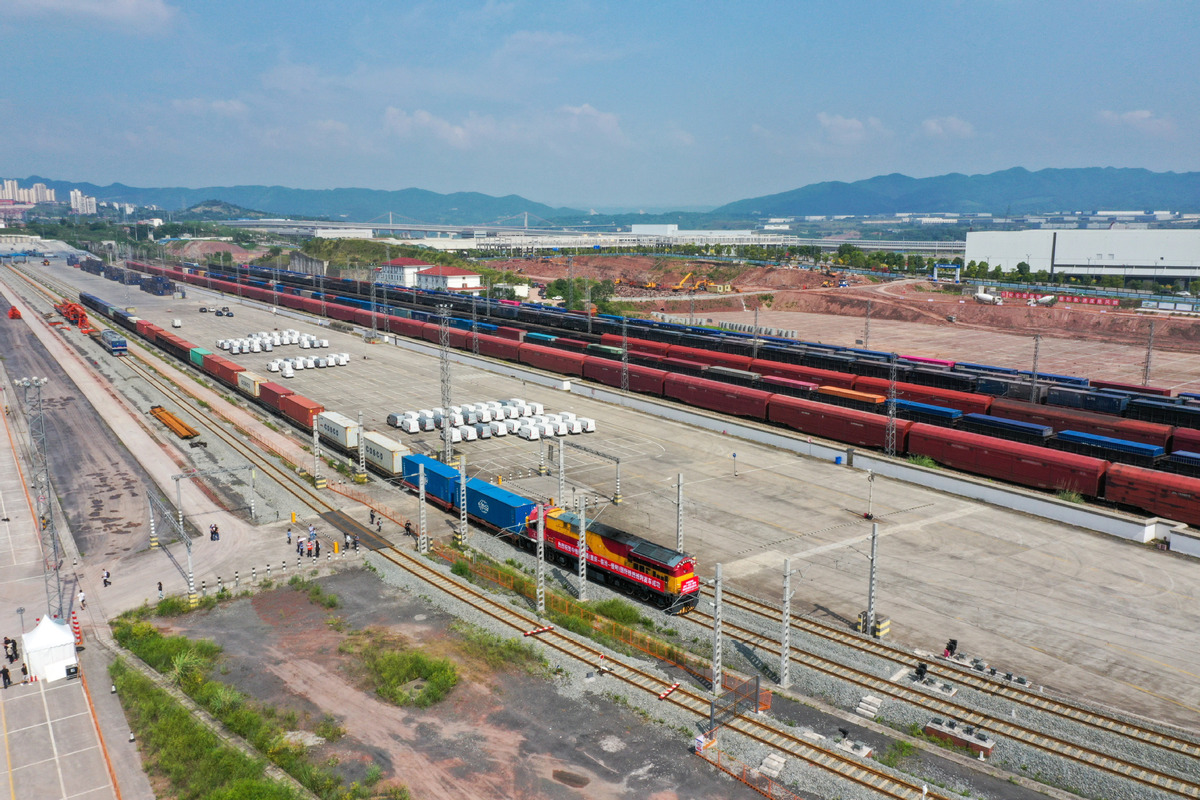Asian moment at forums eyes unity, growth
By ZHANG YUNBI | China Daily | Updated: 2022-06-07 08:06

China, host of BRICS Summit, calls for greater role of developing nations in global governance
Starting this month, a number of high-level global or regional economic forums are going to be held by Asian countries, ushering in an Asian moment for their role in global governance.
Boosting unity among developing countries, revitalizing growth and tackling the global economic downturn are high on the agenda, officials and analysts said. Asia is the largest continental economy accounting for roughly 40 percent of the world's total gross domestic product.
This year, China is expected to host the BRICS Summit, Cambodia will host the Leaders' Meetings on East Asian Cooperation, Indonesia is scheduled to host the G20 Summit and Thailand will be host of the APEC Economic Leaders' Meeting.
The BRICS group comprises five leading emerging markets-Brazil, Russia, India, China and South Africa, and the G20 group accounts for roughly more than 80 percent of the world's total GDP.
Facing a turbulent international situation, Asian countries "should play an active role in peace, stability and development in the region and the world at large", Chinese State Councilor and Foreign Minister Wang Yi told Indonesian Foreign Minister Retno Marsudi on May 25.
Wang said China "fully supports and actively echoes" the joint news release issued by the foreign ministries of Cambodia, Indonesia and Thailand on May 4 about sending a common message by Asia to strengthen solidarity and meet challenges together.

Beijing believes the world should "listen more to Asian voices, respect Asian positions and learn from Asian wisdom", Wang said in a virtual meeting with Cambodian Deputy Prime Minister and Foreign Minister Prak Sokhonn on May 8.
"A shoutout to multilateralism beyond the war has never been more important, as was its invention during World War II for postwar prosperity and peace," the East Asian Forum Editorial Board, located in the Australian National University, said in an article published last month.
"The silver lining is that Asia is heavily invested in multilateralism and home to multilateral platforms that bring together the United States, key Asian states, the European Union and Russia," it added.
Zhu Jiejin, a professor at Fudan University's School of International Relations and Public Affairs, said Asian countries' presidency this year of major global and regional economic forums comes at a time in which "global governance as a whole is faced with potential major setbacks" because of the spillover effect of the Ukraine crisis and US-led sanctions against Russia.
Zhu noted that some other leading forums, such as the G-7 meetings, have drifted away from economic topics onto the Ukraine situation, and "some G-7 members are not earnest about advancing global governance at the moment."
In a video address at the opening session of the BRICS Foreign Ministers' Meeting on May 19, President Xi Jinping underscored that "development is a common task for emerging markets and developing countries".
"Facing the various risks and challenges of the day, it is more important than ever for emerging markets and developing countries to strengthen solidarity and cooperation," he said.
Zhu, the Fudan University professor, said, "By hosting this year's BRICS Summit, China will further display its constructive role as a contributor to the reform of the global governance system.
"Global governance this year is faced with the risk of making zero progress. For the success of BRICS and G20 meetings this year, it is key that the developing countries work closer, seek greater strategic autonomy and further avoid taking sides in the rest of this year."
In recent months, Beijing has publicly encouraged emerging economies and developing countries to turn themselves from "followers" to "forerunners" and even "pacesetters "on the track of global governance.
"Together, we can play a more active role, speak with a bigger voice, help make the international order more just and equitable, and promote more open, inclusive, balanced and win-win globalization for all," Wang, the state councilor, said at a news conference in March.
Sun Weidong, the Chinese ambassador to India, said that "BRICS countries should be leaders of global governance".
"Global challenges are emerging one after another. Only by coordinating global actions can we properly cope with them. 'Small circles' can't solve the 'big challenges' facing the whole world," the diplomat said in an article published in The Hindu last month.
Susan A. Thornton, former US State Department acting assistant secretary for East Asian and Pacific Affairs and now a senior fellow at the Yale Law School Paul Tsai China Center, warned last month about "creeping protectionism, cascading sanction regimes and popular demonstrations of political solidarity such as boycotts in the Asia-Pacific region".
Xu Xiujun, director of the International Political Economy Department of the Chinese Academy of Social Sciences' Institute of World Economics and Politics, said, "As some Western countries are posing major challenges to the world in terms of economy and security, the BRICS countries, as major emerging economies and leading developing countries, should play a greater role in championing the world's peace and security at this moment."
Xu noted that "this special year has endowed special historical duty and mission to the BRICS grouping" given the glum prospects of the global economy.
So far, BRICS cooperation has withstood the test of a drastically changing global political landscape, and "we have also seen rising needs and momentum from the five countries as well as the rest of the world to come along for greater collaboration", Xu said.
Rebecca Sta Maria, executive director of the APEC Secretariat, said in a signed article published on June 1 in the Bangkok Post newspaper that "the world is dividing, and there are few avenues where members can come together to engage in genuine dialogue".
Yang Baoyun, a professor of ASEAN studies at Thammasat University in Bangkok, said, "China has been a staunch supporter to securing unity among the BRICS members and among the vast number of developing countries. What China believes in is a broad community of shared futures rather than a small clique."
























